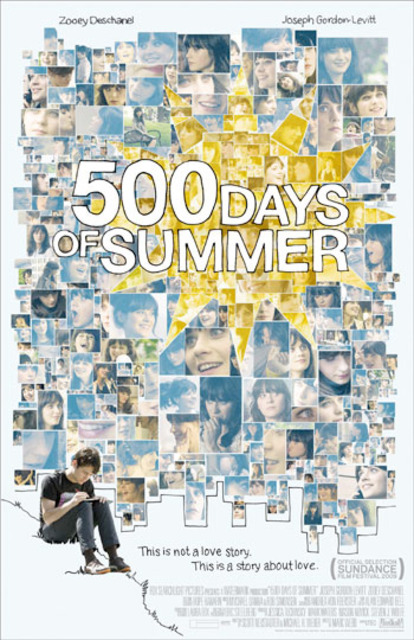(500) Days of Summer - Film Review
By biggest_loser 2 Comments

A young man named Tom (Joseph Gordon-Levitt) who designs greeting cards falls in love with Summer (Zooey Deschanel) a new woman working in his office. Their relationship, including the breakup, is told in a non-linear fashion with a counter appearing onscreen to show what particular days in their relationship we are viewing. At first Summer seems to only want to be friends but then still quickly changes her mind commences a relationship with Tom. They regularly toy with question of whether they are friends or whether they are actually a couple. Gradually, we see the way in which their relationship has worn down Tom and contributed to his bitterness, his attempt to win her back and his eventual realisation on love.
This offbeat comedy, released by Fox Searchlight Pictures, the same distributor as Juno, echoes Eternal Sunshine of the Spotless Mind in the way that it plays with structure in showing the breakdown of a relationship. This is the first film of Marc Webb, who previously worked with music videos. Through its voice over, alternative soundtrack and visual flair like split screens and sketch drawings, the film is high self-conscious about itself as a 'post-Juno' indie film, while also mimicking the likes of Garden State too. Rather than grounding the film entirely in a sense of realism like Juno though, the film jarringly tries to combine a realistic depiction of a relationship with more exaggerated moments. A prologue detailing how Summer's presence alone was able to raise the revenue of an ice-cream parlour, or a conversation in the bed of an IKEA store about how Summer is not looking for an entirely serious relationship, seem particularly unfitting. With a greater sense of restraint and deeper insights, this would have been a more emotionally rewarding film.
Given its non-linear structure, it is surprising how simple the majority of the film is in its representation of a failed relationship. Two of the most visually elaborate moments of the picture highlight this simplicity. After Tom sleeps with Summer, he awakes the next morning full of swagger and begins dancing with people in the street, as an animated bird and a marching band appear on screen. Though funny, this sequence is never used as a platform to extend upon what the relationship is providing for Tom beyond the current happiness we are seeing. Late in the film when Tom has split with Summer, he still attends her party and the film divides itself into a split screen showing how the party briefly plays out on both what he expected to happen and what the reality is. Though again this is a visually clever idea, it plays to the most basic of emotions onscreen, adding little depth or discussion to the failure of the relationship itself. Similarly, sex throughout the film is either highly trivialised or shied away from entirely. Although in one scene Tom and Summer watch a pornographic film together and then try to mimic the same shower sex, there is little attempt to examine tougher issues, like the way that sex is used to sustain even the most unlikely relationships. Only by the end of the film do the most intellectual points, like a discussion of whether relationships come from fate or are coincidental, begin to surface.
Despite a certainly air of smugness about much of the film's humour, the occasional echo of real life is actually very funny to see onscreen: a moment where Tom and his friends examine the exact words that Summer said to greet him and then conclude that if she said hey then she is a lesbian, is a real gem. The film is most truthful in moments like these and had it focussed more on how pedantic people are in examining relationships it may have been even funnier. A great deal of the humour is also derived from the non-linear structure of the film, showing the conflict of emotions for Levitt's character as he moves in and out of his relationship. In one sequence he happily walks into the lift at his office but quickly the film fast forwards with the onscreen day counter and Tom comes out of the same lift looking like a complete mess. Levitt is very good in having to move between such a variety of emotions. Yet given the film is dominated by Tom's perspective, it is unfortunate that Summer herself becomes a less interesting character. Though early on we learn that her parents' divorce left her not wanting a relationship and that she sporadically moves from being interested and thoroughly uninterested in Tom, her character feels quite hollow with little attempt to examine who she really is and why she is so unsure. She is a rather beautiful but less interesting figure of the film.
Although one can appreciate (500) Days of Summer for attempting something different with the romantic comedy genre, this is still a rather disappointing and shallow film. Despite its elaborate structure, the film seems to have a very minimal number of new and interesting insights into the failures of a modern day relationship, beyond the see-saw of emotions that it produces for someone. The film has a number of surprising visual tricks, but if the same creativity had been placed into the screenplay it would have made for a much more memorable film. There are still laughs to be found though and Levitt remains a standout, just don't expect any long-term fulfilment.


Log in to comment